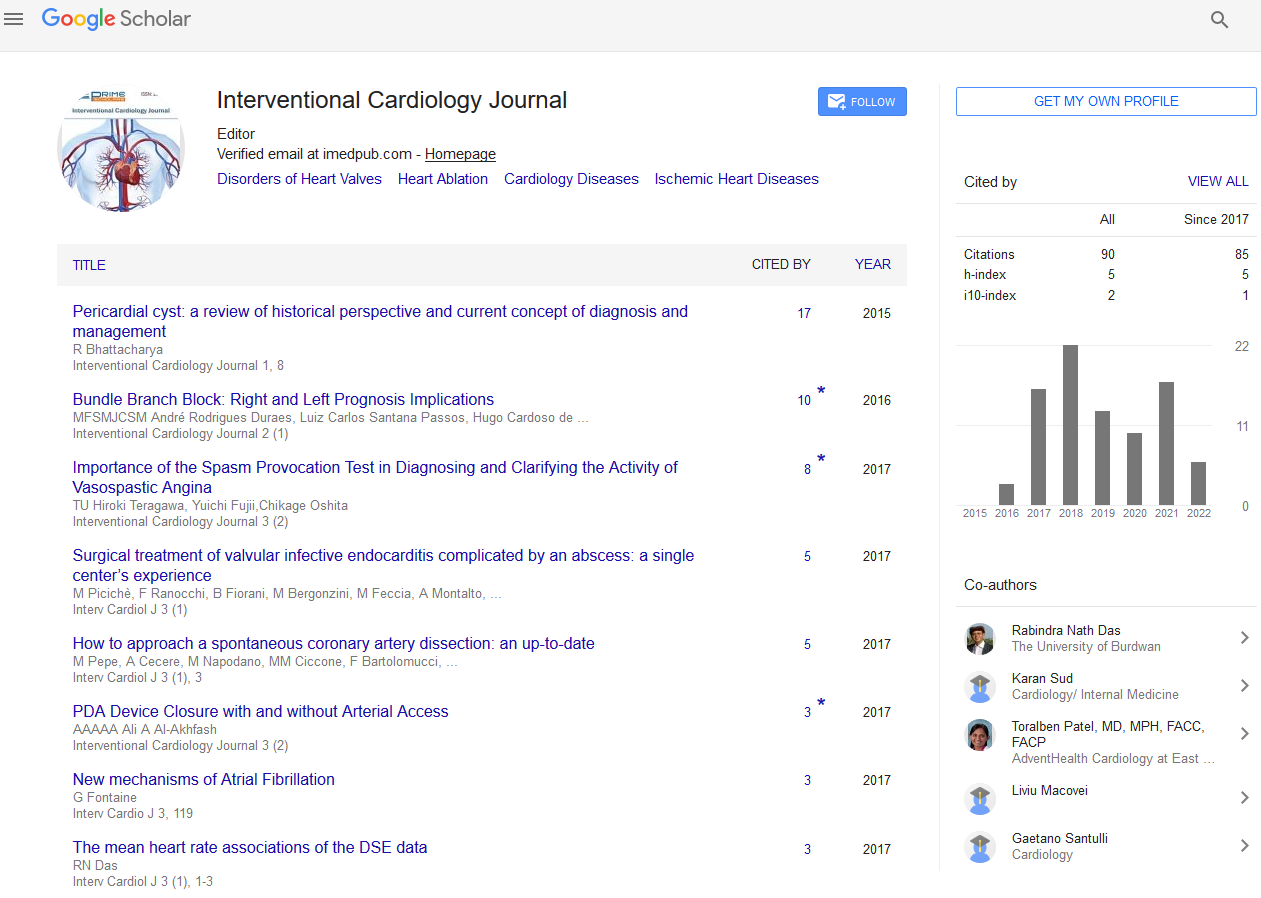Opinion - (2023) Volume 9, Issue 6
Cardiology Surgeons: Masters of the Heart's Complexity and Care
Edward Cull*
Department of Cardiology, Emory University, Georgia
*Correspondence:
Edward Cull,
Department of Cardiology, Emory University,
Georgia,
Email:
Received: 31-May-2023, Manuscript No. IPIC-23-17551;
Editor assigned: 02-Jun-2023, Pre QC No. IPIC-23-17551 (PQ);
Reviewed: 16-Jun-2023, QC No. IPIC-23-17551;
Revised: 21-Jun-2023, Manuscript No. IPIC-23-17551 (R);
Published:
28-Jun-2023, DOI: 10.21767/2471-8157.9.6.58
Introduction
The human heart, often called the "seat of the soul," is a remarkable
organ that sustains life by tirelessly pumping blood
throughout the body. In cases where the heart's intricate machinery
falters, cardiology surgeons step onto the stage as
modern-day heroes, using their expertise and skill to mend
and heal. This article takes you into the world of cardiology
surgeons, exploring their roles, training, surgical techniques,
the challenges they face, and the profound impact they have
on patients' lives. Cardiology surgeons, also known as cardiovascular
or cardiac surgeons, specialize in the surgical treatment
of heart and blood vessel diseases. Their primary aim
is to repair or replace damaged or diseased heart structures,
enabling the heart to function effectively and restore patients'
overall health. Cardiology surgeons collaborate with a multidisciplinary
team, including cardiologists, anaesthesiologists,
and nurses, to ensure comprehensive patient care. Becoming
a cardiology surgeon requires a rigorous educational path and
a deep commitment to acquiring the necessary skills. The journey
begins with completing a bachelor's degree followed by
medical school, where aspiring surgeons learn the foundational
principles of medicine. After medical school, graduates enter
a surgical residency program, which typically lasts five to seven
years.
Description
Cardiology surgeons are skilled in a range of surgical techniques
designed to address different cardiac conditions. Coronary
Artery Bypass Grafting (CABG) often referred to as "bypass
surgery," involves creating new pathways for blood flow when
coronary arteries are blocked or narrowed. The surgeon uses
blood vessels from other parts of the body to reroute blood
around the blockages, restoring proper circulation to the heart.
Cardiologists surgeons repair or replace damaged heart valves
that may be causing problems such as valve stenosis or regurgitation.
Valve repair is preferred when possible, as it preserves
the patient's own tissue. Surgeons repair or replace the aorta,
the body's main artery, when it becomes weakened and
balloons out (aneurysm) or when it becomes narrowed (aortic
stenosis). In cases of severe heart failure, cardiac surgeons
perform heart transplantation, replacing a failing heart with
a healthy donor heart. Advances in technology have allowed
for minimally invasive procedures, where surgeons make small
incisions and use specialized instruments and cameras for precise
surgery. These techniques often result in shorter recovery
times and reduced scarring. While the work of a cardiology
surgeon is undoubtedly rewarding, it comes with its share of
challenges and responsibilities. Cardiac surgery involves high
stakes, as even small errors can have life-altering consequences
for patients. Surgeons must maintain the highest level of precision
and concentration.
Conclusion
Cardiology surgeons stand at the crossroads of science, technology,
and compassion, wielding their expertise to heal and
restore the heart's rhythm. Their journey from medical school
to the operating room is one of dedication, skill-building, and a
commitment to the well-being of their patients. With every surgery
they perform, they contribute to the narrative of human
resilience and medical progress. As we marvel at the incredible
feats achieved by these surgeons, let us remember that behind
every successful operation lies a deeply human connection, a
story of hope, and a heart set on mending hearts.
Citation: Cull E (2023) Cardiology Surgeons: Masters of the Heart's Complexity and Care. Interv Cardiol J. 9:58.
Copyright: © 2023 Cull E. This is an open-access article distributed under the terms of the Creative Commons Attribution License, which permits unrestricted use, distribution, and reproduction in any medium, provided the original author and source are credited.

